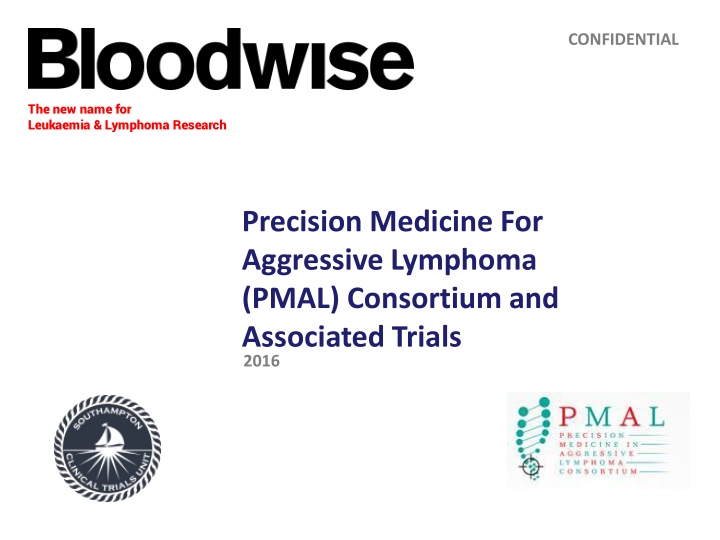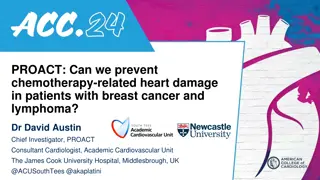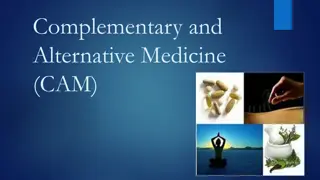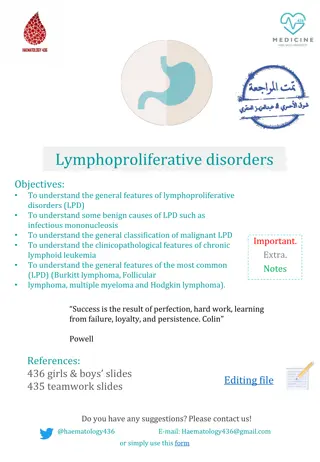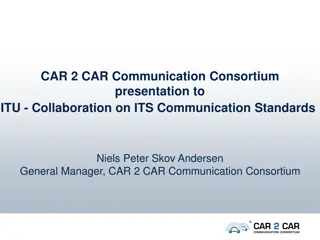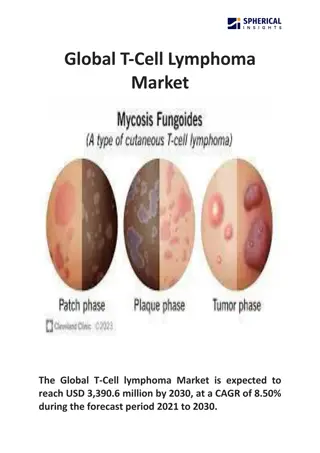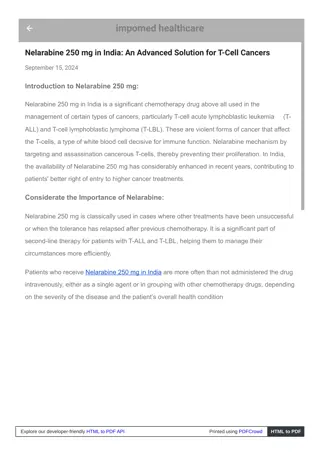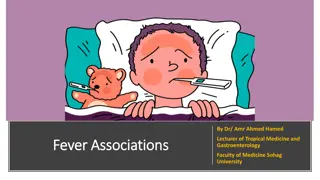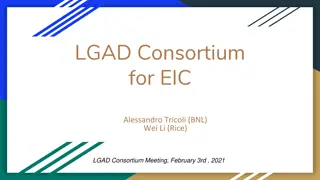Precision Medicine for Aggressive Lymphoma (PMAL) Consortium Overview
Tackling Diffuse Large B-cell Lymphoma, a clinical challenge with standard RCHOP care resulting in 75% cure rates but poor outcomes for relapsed patients. The PMAL Consortium is a national network spearheading diagnostic and therapeutic research to develop robust predictive molecular assays and test novel therapies through clinical trials.
Download Presentation

Please find below an Image/Link to download the presentation.
The content on the website is provided AS IS for your information and personal use only. It may not be sold, licensed, or shared on other websites without obtaining consent from the author.If you encounter any issues during the download, it is possible that the publisher has removed the file from their server.
You are allowed to download the files provided on this website for personal or commercial use, subject to the condition that they are used lawfully. All files are the property of their respective owners.
The content on the website is provided AS IS for your information and personal use only. It may not be sold, licensed, or shared on other websites without obtaining consent from the author.
E N D
Presentation Transcript
https://bloodwise.org.uk/sites/all/themes/bloodwise/images/theme/logo/logo-main-header.pnghttps://bloodwise.org.uk/sites/all/themes/bloodwise/images/theme/logo/logo-main-header.png CONFIDENTIAL The new name for Leukaemia & Lymphoma Research Precision Medicine For Aggressive Lymphoma (PMAL) Consortium and Associated Trials 2016
Tackling Diffuse Large B-cell Lymphoma Clinical Problem Standard of care, RCHOP, results in cure rates around 75% Relapsed/ refractory patients have largely ineffective treatment options with very poor outcomes, around 21% 3 year EFS. Heterogeneous Disease Translocations- Myc 10%, Bcl2 20%, Bcl6 30% >200 mutations with low frequency- few >10%, 30-50 mutations in each lymphoma. Cell of Origin by GEP- ABC, GCB, PMBL and unspecified. Lymphoma biology guides potential therapeutic targets. Novel agents Variety of novel agents in development targeting a range of mechanisms including immunotherapy and small molecules. Several new agents show revolutionary effects in other malignancies (eg melanoma) and other B-cell disorders. To date this has not been translated to DLBCL. 2
PMAL - A national network of diagnostic and therapeutic research Leeds HMDS laboratory Bioinformatics hub Andrew Jack, Reuben Tooze, Cathy Burton, David Westhead, Matt Care, Sharon Barrans, Michael Bentley University of Oxford Molecular haematology Bioinformatics Anna Schuh, Simon Holmes University of Cambridge Molecular pathology Genomics Ming Du St Bartholomew s, London Genomics, cfDNA Jude Fitzgibbon, Shamzah Araf SAB - Jonathan Pearce - Lymphoma Association Adrian Newland - Chair, Scientific Advisory Board John Radford NCRI Clinical Studies Group Chair University of Southampton Clinical Trials Unit Peter Johnson, Andrew Davies, Gareth Griffiths, Tom Cummin, Shamim Kazmi-Stokes (HB - Bath)
Consortium work streams developing molecular assays, longitudinal analysis and clinical trials Development and validation of robust predictive molecular assays for use in stratification. DELIVERABLE: Development of validated technology for cell expression signature, copy number variation and mutation screening, effective in small biopsy samples, for use across the consortium as biomarkers WS1 (Leeds/Oxford) WS2 (Barts) Developing assays for longitudinal analysis and clonal evolution DELIVERABLE: Analysis of the stability of mutational profiles and transcriptomesin paired sequential biopsy samples, with initial data on the utility of plasma nucleic acid as a surrogate target WS3 Bioinformatics and statistics DELIVERABLE: A genotype-phenotype database for lymphoma containing quality-assured data, curated for use by all members of the consortium (Cambridge and Leeds) Prospective testing of stratified therapy with novel agents DELIVERABLE: 3x Ph I/II trials in development, Ph 3 finished recruitment, - exploratory studies that define predictive markers and putative MOA. Ongoing molecular study. Future 1 Ph III confirmatory study that draws upon the characterisation of heterogeneity. Umbrella study- molecularly-stratified novel agents in R/R DLBCL. WS4 (So ton) 4 PMAL Consortium
PMAL Process Map Illumina, Affymetrix, 14M genomics Pt. biopsies and plasma samples from 4 sources Bloodwise & Scientific Advisory Board WS1 - Development and validation of robust predictive molecular assays for use in stratification 9 milestones WS2 - Developing assays for longitudinal analysis and clonal evolution 5 milestones Pharmaceutical collaborators WS3 - Bioinformatics and statistics 7 milestones WS4 - Prospective testing of stratified therapy with novel agents 13 5 milestones
Studies to Date and in Development- Southampton Clinical Trials Unit REMoDl-B Largest Phase III RCT in DLBCL. Utilising prospective molecular testing to investigate RCHOP + bortezomib. Completed recruitment ahead of schedule >1000 patients- awaiting primary endpoints. MaPLe Nationwide molecular study of DLBCL- recruited > 1000 patients- study recently expanded to include 3000 participants. Mutations & cell of origin. Identify targetable mutations for/at relapse. Phase 1b/II 3x DLBCL novel agent clinical trials in development- first on schedule to open Summer 2016, the second 1 January 2017. Multi-arm Multi-stage/ Umbrella study in R/R DLBCL In development and discussions with pharmaceutical collaborators to include novel agents and novel combinations in a multi-arm multi-stage molecularly stratified clinical trial for relapsed/refractory DLBCL. Academic Sponsor with provision to provide data as supportive evidence for FDA licensing. 6 PMAL Consortium
Multi-Arm Multi-Stage/ Umbrella trial Future of Clinical Trials Adaptive MAMS clinical trials provide the next generation of contemporary trial designs allowing assessment of multiple agents targeting molecular subgroups. The traditional trial designs are likely ill-equipped to answer the research questions posed to improve DLBCL therapy. Biomarker-driven interim analysis allows responses to be assessed promptly. Seamless phase progression allows fast-tracking of promising agents to provide evidence for clinical use. Prospective molecular testing and analysis allows subgroups to be identified and further investigated. 7
MAMS/ umbrella trial- simplified schema Prospective mutation analysis and COO with outcomes Relapsed/ Refractory DLBCL- Central Screening- Single Master Protocol Lack of response- end unsuccessful arms Cross-over between arms at progression Arm A Arm B To include mCR determined by PET and exploratory biomarkers- (cfDNA) Biomarker-driven Interim Analysis Molecular profile/ mutation status to direct Agents- (MaPLe, baseline biopsy) Arm C Expand arms with interim success to meet clinical endpoints- PFS/ OS Seamless phase progression Arm D Arm E Adaptive trial design- arms/ agents/ targeted mutations and seamless transition between phases 8
